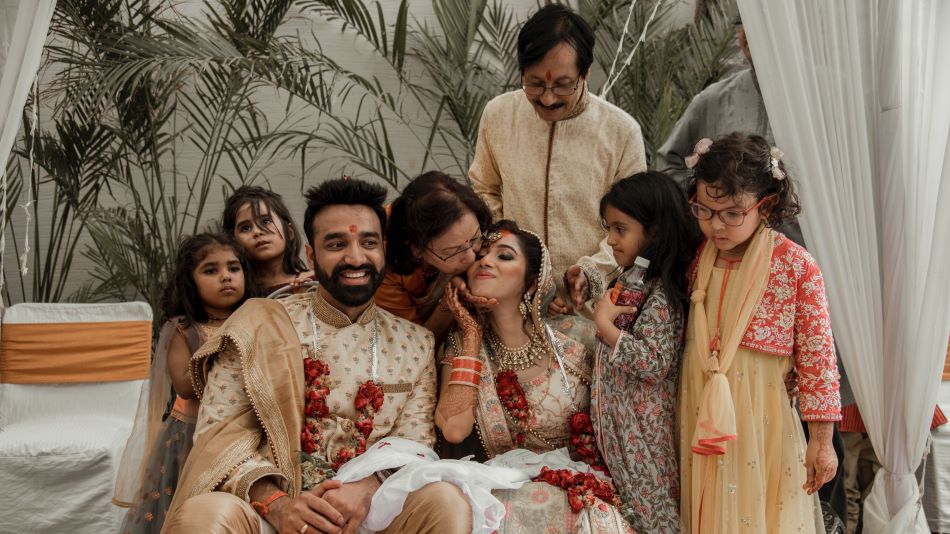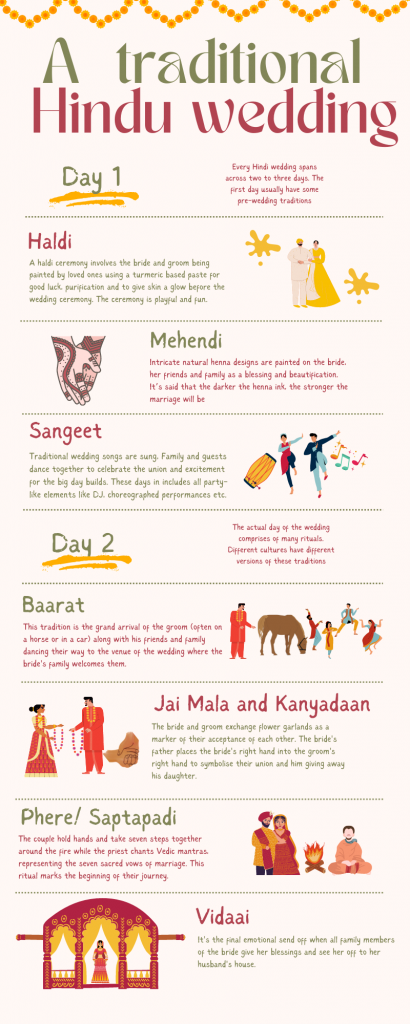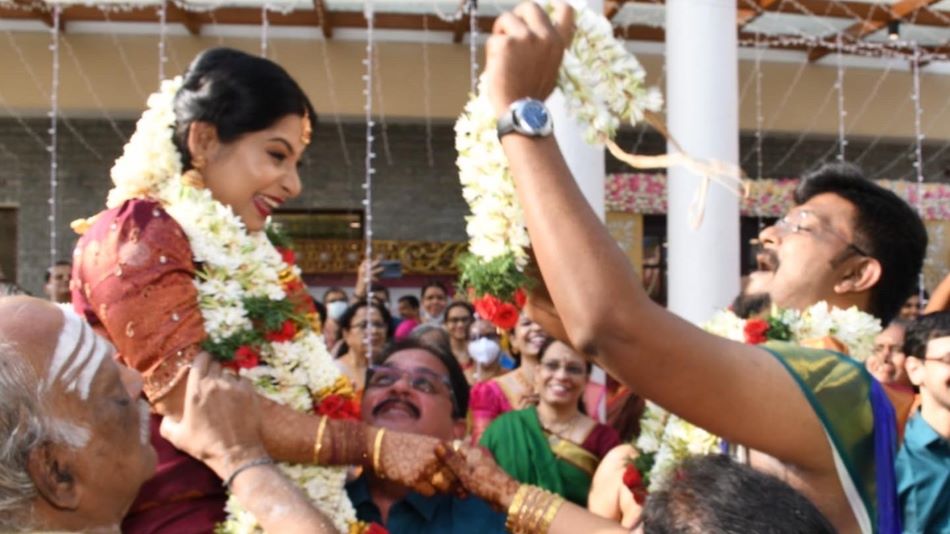While there are many debated surrounding several Hindu wedding rituals, at the heart of it all is family. Why are these rituals still so important and meaningful to people in modern day India?
In the middle of her wedding proceedings, when Niveditha saw her parents bend on their knees and wash her fiancé’s feet, she could not hold back her tears. She could not stand the thought of her parents participating in a ritual so regressive.
Niveditha, a 28-year-old social media professional from Bengaluru, says, “I felt the lack of basic respect itself there. I got really uncomfortable because I can’t see my parents touching anyone’s feet except somebody who is older than them.”
The ritual is believed to have stemmed from the superstition that the son-in-law is a representation of the Hindu lord Mahavishnu. Niveditha recalls the moment when the priest who has officiating the wedding said that this ritual can be eliminated if required.
She says, “The priest also doesn’t find it necessary, which means it’s not like a compulsory part of the tradition, so why do it? The fact that my mother pushed for it and she wanted to do it, set me back… I could see that my husband was uncomfortable too.”
Although Vishnu Prasad, Niveditha’s husband, admits to being uncomfortable in the moment, he feels that in retrospect he understands the place parents come from. He says, “I’ve had the practice of touching elders’ feet, but the other way around, their age made it weird. But when I see it now, I feel if I was a parent, I would want to do this. Because that day, all these things made me feel like a different guy.”
However, Niveditha feels differently. She said, “He said that if he had a child, he would want to do it. But being his partner, I would never agree to that. I love my child but this is not the way to show it.”
It is said that through out the wedding, the bride is seen as goddess Lakshmi and the groom is seen as lord Mahavishnu, and most of the rituals happen with that analogy in play. But when it comes to this one ritual, its only the man whose feet are washed.

Niveditha says, “Washing a woman’s feet was never considered highly, which is why the practise never came in the picture the other way around. The very fact that it is rooted in chauvinism. But also, irrespective of whether it is my feet being washed on his, it is the respect for their age that should be there.”
The night of the wedding is considered the “first night” for the couple. The couple is blessed by elders and sent into a room to consummate their marriage and begin their union. Many young couples feel that in the current day and age, this practice is not only weird but also redundant. Niveditha and Vishnu Prasad also faced the wrath of this ritual.
Vishnu Prasad says, “We were entering that room and there already people inside. There are people outside. They just randomly say all the best and say give us ‘good news’ in a year. It’s just so weird for us.”
Niveditha recalls one particular ritual from that night which was bizarre to her. She says, “My uncle and aunt went into the room and sat on the bed on which we are supposed to ‘do it’ because they are successful couple with a child. That is so creepy. Like, why would you do that?”
How a wedding is done and what rituals it comprises of has an impact on not only the couple but also the people in attendance. Especially in inter-caste weddings. Niveditha pins that as a reason for a lack cohesiveness between the two families at her wedding.
I felt like this is something bigger than me
Vishnu Prasad
She says, “Our entire wedding happened according to my caste rituals. His family wasn’t able to understand a lot of it. And even if they did, I don’t think they would be interested because it’s heavy on religious aspects like the mantras.”
Vishnu Prasad felt slightly differently to his wife. He says, “There were some people who I observed where invested in the ceremony, despite not being involved any point. There’s no denying that it is guided by caste but I think it would be very unfair to say that there’s not a part of stupidity.”
Even though they had a couple of uncomfortable moments through the wedding, both Niveditha and Vishnu Prasad feel that they understand why parents want to do certain things and hence are okay to make a little compromise. Vishnu Prasad says, “I felt like this is something bigger than me. This is very important. So many people come together to make this one bigger happen for us. That’s how big a marriage is to them.”
On the other hand, Niveditha felt that she owed it to her parents to participate in some rituals that weren’t ideal to her. She says, “You just feel bad because anyway, they’re doing so much for you. You don’t want to question the one thing that they like to do for themselves.”
“Besides, those are age old traditions which they have meaning do. And the some of them are so superstitious, some of them make sense. And you can’t really question them”
Niveditha and Vishnu Prasad are one of the many couples in India who still inevitably conform to their family. According to research conducted in 2018, 82% of Indian millennials (ages 22-29) live with their parents. Vishnu Prasad feels that this could be a big contributor in the parent-child dynamic in India.
He says, “We are talking about a country we don’t even know how to choose the right partner for ourselves. Parents pick that also. We are very protected till the age of 27-28, which is probably why we need these spiritual things to kind of transform us.”
Another reason which can attributed to this phenomenon is the history of marriage in India and how it came to be. According to Niveditha, the system of child marriage in India may have perpetuated this. She says, “Kids used to get married. The girl and the guy barely knew anything. They were just 11-12 years old when they got married, so they don’t even know the world. How do you think they would choose what kind of wedding they want? And that is why parents made the decisions.”

Having said that, as a daughter in an urban family in the 21st century, Niveditha feels that things are changing. She says, “My parents did ask me how I want my wedding to be. I feel like now every parent gives their child that privilege. For example, nowadays people are having destination weddings. You really think that parents are taking the choice? No, it’s the bride and the groom.”
Although she always wanted a small minimal wedding, Niveditha agreed to have a big traditional wedding to make her parents and partner happy. She says, “I met him and I understood that he is somebody who likes these things because he wants to celebrate love. Both my parents wanted it to be big because it’s the first wedding in the family. They wanted to call everybody.”
As for Vishnu Prasad, a big wedding wasn’t something he always thought of because of another social implication as to what is expected of men. He says, “Men aren’t allowed to dream about those things because for men in general, it’s all about success you create. For women It’s about joining that success. Even now that’s the reality of India. From where I stand, I can say it’s wrong.”
While there’s no doubt that some of these rituals can be perceived as regressive in nature, Vishnu Prasad feels that it was necessary for him to experience it. He says, “I feel like in my marriage the rituals dawned on me and turned on a little bit of a spiritual side in me, which I felt like made me more responsible.”
However, Niveditha feels that its more about knowing what you’re fighting for if the harmony of the family is at stake. She says, “Firstly we are not given a choice. And secondly, even if I was, I don’t think I would poke in a lot of things. It’s just that we’re not educated about it, we don’t know why this is just happening. I put my opinion forward, but obviously wanted to do it. They had some history behind doing it.”
Many couples in India find it harder in comparison to couples from other first world countries, to question their parents and challenge rituals. The extremely relevant practice of arranged marriage is attributed as one of the reasons for this. Research conducted in 2018 shows that, a whopping 93% of marriages in India are arranged.
Chahat Awasthi, a financial reporter in UK, who recently got married says, “When your parents have arranged everything for you, they might just want to control the other aspects as well.”
According to Vishnu Prasad, not having the ability to choose your own partner in a country with such a big population speaks volumes about your ability to question things you don’t even know about. He says, “In other countries they choose their partners. They know what you’re looking for. We don’t have the knowledge. We figure it out as we go. So, in that case how can we question parents about something they’ve known and believed for decades?”
You have to show disinterest in everything
Niveditha
A couple of years ago Sharmistha Chaudhari, a US-based PR professional decided to change things about the way she got married. But she didn’t know where to start. Her mother, who was in support of her decision to do things differently suggested they hire priestesses instead of priests to officiate their wedding.
They went on to hire the Shubhamastu collective who are a group of female priestesses operating with the aim of making Hinduism more inclusive and appealing to younger and more progressive adherents.
While speaking to the NPR, Nandini, one of the Shubhamastu priestess, said, “I have just omitted those portions [of Hindu wedding liturgy] which are regressive to women. Like kanyadaan, the donation of the daughter to the husband and in-laws. How can I keep that, when women of today are so enlightened? They are empowered.”
While Sharmistha isn’t the only one who managed to bring change, it can be said that it is still an upward struggle for most couples in India to carry out what she could. As a couple that had questions, wanted change, conformed and then realised why somethings happen the way they do, Niveditha and Vishnu Prasad both picked up their share of learnings.
According to Niveditha, Indian parents are very protective when it comes to hanging on to their traditions and rituals and hence you have to prepared for a long battle with them. She says, “No Indian parent is going to go with a non-traditional just for the fun of it unless you get married in lockdown or are the last child of the family. You show disinterest in everything. You have to be ready to fight it out for a year or like a year and a half to convince your parents to do it your way.”
Vishnu Prasad however, feels like there is an element of family politics in it. He says, “Pay for your own wedding. Its simple. You pay, you call the shots. That is also why it is a lot easier in Western countries than it is here in India.”
Having settled for a wedding way bigger than she had ever wished for, Niveditha feels that in retrospect there’s no aspect of it that she would change. She says, “For me marriage used to be something which is just a government stamp. But now that I’ve had a wedding I understand that its about the two families coming together and getting to know each other better.”
As for Vishnu Prasad, his wedding was a process of creating a new family. He says, “There’s been a lot of exchange of love. I feel like you get to see new people who like technically don’t have any connection, but just that one wedding changes everything. It becomes family.”

